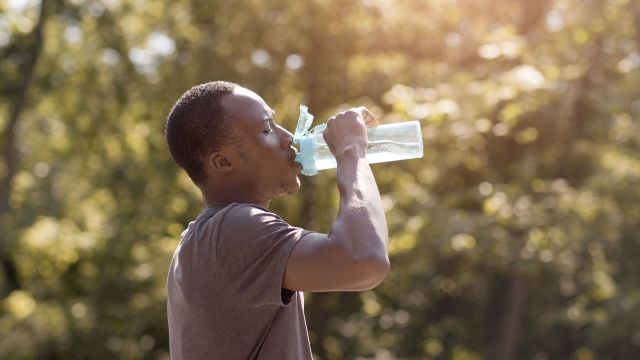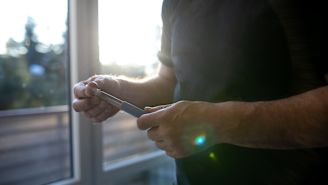We all have ideas about how weight loss should work: choose healthy food, reduce your portion sizes and move your body.
But do we understand how it really works? How does your body store—and expend—calories? Where does fat go when it’s burned off? Why can you get fitter and slimmer but gain weight?
Lucky for us, Darria Long Gillespie, MD and Keith W. Roach, MD are here to break it down in real terms. In this first installment of our exclusive series—The Science of Weight Loss—Dr. Gillespie and Dr. Roach separate the facts from the fiction to give you the knowledge you need to make meaningful changes.
When people think about weight loss, they think about losing fat. Just so we understand our starting point: What is fat, and how do you burn it off?
Dr. Gillespie: Your body’s primary energy source is glucose—also known as blood sugar—which your body gets when you break down the food you eat. Your body uses some of that glucose directly for energy, and excess glucose is stored in either of two forms: glycogen and fat.
Glycogen could be thought of as your body’s short-term energy source: your cash account or checking account. Because your brain and other body cells require a constant supply of glucose, if your blood glucose levels run low (for example, if it’s been several hours since you ate), your body will start burning through its glycogen stores.
Once your body has exhausted its glycogen stores—which takes about 10 to 12 hours—in general, it then turns to burning fat for fuel. So, if glycogen is your cash or checking account, think of fat as your body’s 401k...
Dr. Roach: …or savings account.
Dr. Gillespie: Right, I like that! Fat as the savings account.
Dr. Roach: And the actual “currency” of energy that is moved around inside the body’s cells—whether from your checking account or from your savings account—is a molecule called ATP.
What’s ATP?
Dr. Gillespie: ATP stands for adenosine triphosphate. When fat is broken down for energy, for example, it’s converted into ATP, which our body uses as energy.
Dr. Roach: And fat happens to be a very efficient way for the body to store energy. When times are good and you're able to take in more calories than you need, you can stick the extra calories into your savings account. Then, when the cold winter comes and you need some extra calories, you will burn those calories off again.
Put simply, when you’re expending more energy than you're taking in on any given day—once you’ve exhausted your glycogen or, you could say, tapped out your checking account—those calories have to come from somewhere, and fat is the ideal place for them to come from.
What happens when you start burning fat?
Dr. Roach: On a molecular level, fat consists of long chains of carbon atoms. When fat is broken down by the body, those molecular bonds are unshackled and the energy released from those bonds is used by the body for our biological processes.
So energy is released, but what happens to the residues of that chemical reaction? Do they just kind of hang around in the body?
Dr. Roach: Ultimately those long carbon chains devolve into carbon dioxide and water, which your body expels when you breathe and when you pee. So, yes, you are almost literally “burning off” your fat. But that only happens under conditions of calorie debt: when you are expending more calories than you're taking in.
In other words, when you burn more calories than you take in, you burn fat, and that’s how you get thin and lose weight?
Dr. Roach: It’s not that simple. In addition to the burning off of fat, weight loss can also come from the loss of lean body mass—also known as muscle—and from the loss of water. For most people, losing weight involves the loss of some of all three, but it doesn't always have to. To a large extent, it depends on how you're losing the weight.
If you're on a starvation diet, for example, you're going to lose from all three components. Initially you'll lose some fat, but with fat loss always comes some water loss. And if you’re not exercising you're going to lose lean body mass as well.
When you read criticism of fad diets, experts always seem to say that any results you’ll see are just from the loss of “water weight.” If water weight is not a real weight loss goal, would a better goal be to have your loss come from fat alone and not from water and muscle?
Dr. Roach: Sort of. You can try to minimize water and muscle loss, but a little of each is inevitable. As clinicians, when we're helping people lose weight, we always want to make sure that people are continuing to exercise—to maintain and build muscle—and staying properly hydrated. That way, the loss of the water component can be balanced out and fat loss can be achieved without losing lean body mass. At the same time, hopefully, you’re even gaining some lean body mass.
The thing is, though, when many people adopt a healthier lifestyle—through diet and exercise—they may end up losing fat and gaining muscle but not end up actually losing much weight. It can be frustrating.
Wait, if you’re losing fat, why doesn’t that mean you’re losing weight?
Dr. Roach: The reason is that those three components—fat, water weight, lean muscle—weigh different amounts. Muscle is very dense compared to fat. So, when you’re burning fat while building muscle, you might actually be adding denser and heavier mass to your body.
Dr. Gillespie: That’s why when you’re measuring your progress at weight loss, in addition to just counting the pounds on the scale, it’s important to monitor waist size, or to pay attention to how your clothes fit.
But, there’s an important caveat: for most people who are gaining weight, it’s not because they’re gaining muscle. That really will only be the case if you’re really involved in a muscle-strengthening workout routine. If you are doing that, then you really do want to track these other metrics, besides pounds.
Dr. Roach: And when you measure waist circumference, you can do that formally—with a tape measure—or informally, by noticing how your pants fit, for example. People might find that their pants have gotten a little bit looser, but they haven't lost a pound. The answer is that they may be putting on muscle bulk while losing fat around their midline. They're becoming healthier in two different ways, even though the scale hasn't changed.
To make sure you’re burning more calories than you take in, it sounds like it pretty much comes down to mathematics: Calories in from food. Calories out from exercise. Make sure your calories out exceed your calories in and you’ll lose weight?
Dr. Roach: The answer is yes, but complicated, because it has to do with what happens with hormones…
Dr. Gillespie: …and metabolism.
Hormones? Metabolism? I think we’re going to need a bigger article…
Learn more in the next installment of The Science of Weight Loss—How to Hack Your Metabolism for Weight Loss.
Darria Long Gillespie, MD, MBA, FACEP, is an emergency department physician and clinical assistant professor at the University of Tennessee School of Medicine.
Keith W. Roach, MD, FACP, is associate professor of clinical medicine at Weill Medical College of Cornell University in New York City and an associate attending physician at New York-Presbyterian Hospital.






